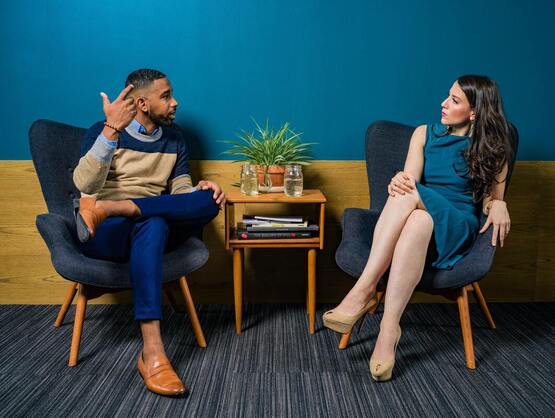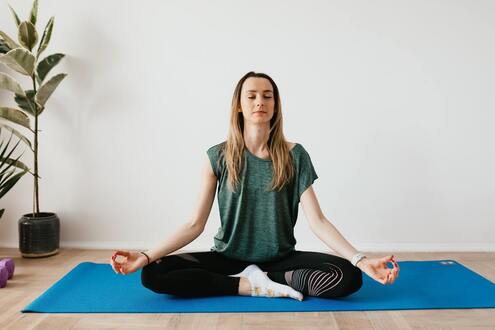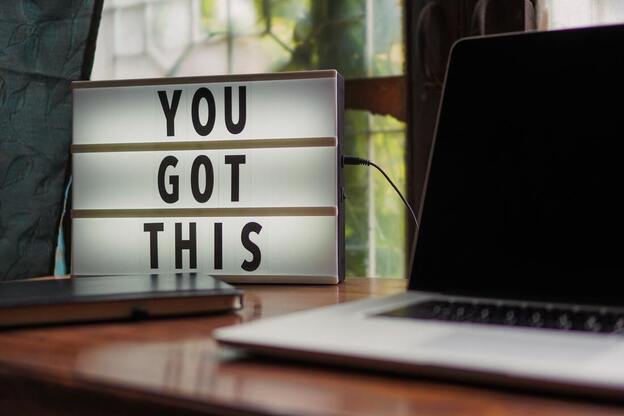|
Are you building the habits you want to build in your relationship? This is the eleventh episode of a series on Getting Ready for Marriage. In this podcast episode, Elizabeth Polinsky discusses ways to develop healthy relationship habits.
IN THIS PODACST
Why I am doing this series on Getting Ready for Marriage?
I had a wedding photographer reach out to me asking me to provide some tips for couples getting married. I created an entire checklist for her with the things I think are foundational for getting ready for marriage and starting off your marriage on the right foot. If you want the checklist, you can download it here!
A healthy habit I didn't realize I had until...
Welcome back to the communicate and connect podcast! We have been doing a series on getting ready for marriage and this is gonna be one of the last episodes in this series. We have one more for the series after this, which is gonna be an interview that I do with Reverend Cali on premarital counseling. But this is the last content one on this topic. Way to stick in there! If you've listened to all of them, I would love to know it! Find me on social media or tag me and tell me if you've listened to all of these episodes on getting ready for marriage.
If you have thoughts or questions about things that you want to see covered in this podcast please go to www.communicateandconnectpodcast.com. There is a form on the website for you to submit questions or ideas or things that you want covered. So for the last one, we're really talking about habits; and this is because everything that we've covered so far in this series is about skills. And skills are things that can be learned. You usually have to use skills intentionally but eventually you want them to become habit. I was thinking about habits recently when I was remembering a weekend trip that my husband and I went on with some friends a few months ago. On this trip, somebody was telling me a traumatic story from their life and was sharing it with everybody. I just sat there. I was so angry about what they had gone through that I didn't even know what to do with the anger. And I just said, "I feel so angry" and I just sat there and I said it a few times. I said, "I am so angry right now, I'm just so angry". Somebody who was in the group with us, our friend, he was really impressed by my ability to just state my feelings and sit there and and say what I was feeling without somehow reacting in some bigger way. I'll say for me, I didn't even realize that I was doing this because it's so ingrained in me. This is probably because I am a marriage counselor and I've been practicing therapy for a long time. This is part of the skill set that they trained therapists in, but I didn't even realize I was doing it because it was so ingrained. That is really what we want to happen when we're thinking about skills for a relationship. You have to implement a skill, and implement the skill on a regular basis over and over and over again--to where that becomes part of he culture of the marriage and the culture of the relationship. We are what we repeatedly do. Excellence then is not an act but a habit" -– Will Durant, american writer The difference between a habit and a routine
You want a skill to become ingrained to where it's so ingrained you're not even thinking about it. This reminds me of a quote that I saw by Will Durant, an american writer, who said, "we are what we repeatedly do. Excellence then is not an act, but a habit". I think that applies to marriages as well.
Our marriages are what we repeatedly do to make our marriages that way. So forming habits is about doing the skills so many times that it becomes muscle memory. It's different than a routine. A routine is something that sometimes still has to have some intentionality. So for example for me working out; I have to be really intentional about working out. I go through phases where I will be really great about working out and I'll have a health kick. My health kick lasts maybe six months, maybe a year, and then it stops and I just am no longer on the health kick. That is a way that I know it's not really a habit. It was part of a routine that I had to intentionally engage in. But a habit is something that's more on autopilot. Sort of like when you drive and you are so used to driving one way that you go in that direction and you don't even think about it even though you needed to go in the opposite direction. That is a habit that is on autopilot, and that's where we want these relationship skills to be, How to build a habit
So how do you form a habit?
Some habits don't take that long to form. They maybe take a month. And other habits take several months to form. Some things are easier to build into habits than others, and then other things are more challenging and take longer. Healthy relationship habits worth building
What are some habits that you could work on to improve your marriage? Here are some that I came up with off the top of my head. You can go back through any of the episodes in this series that we've covered. Pick one of those skills you want to be the habit you're gonna try to develop.
Some examples for you for this episode: "I feel" is a really lovely habit to develop for your communication in a marriage but also for your own ability to regulate your own emotions. There's a lot of research that shows that just identifying my own emotions helps helps regulate it. By that I mean, it helps your feelings not be so overwhelming. Identifying your feelings is a way of coping with my feelings. So both on an individual level, just for yourself, but also in your relationship, if you can start identifying your emotions and just making statements of, "I feel XYZ emotion", "I feel angry", "I feel sad", "I feel disappointed", "I feel anxious", "I feel afraid", "I feel jealous", "I feel hungry", "I feel tired"....... all of these feelings that you can have. Just getting into the habit of identifying how you feel, naming how you feel, and sharing how you feel and stating it in the phrase: "I feel this". That's a lovely habit to form for yourself, but also for your relationship. On the relationship side, that makes it more about you less about your partner. Then it doesn't come off critical or attacking. For example, if my partner decided they wanted to go do something with a friend and so they were no longer gonna come do whatever they said they were going to do with me. Or if I thought we were going to do something and then I find out they were he was going to do something with a friend, I might say: "I feel disappointed". That is a fact about how I feel. That's perfectly fine for me to say, and it makes it about me instead of saying "oh you you shouldn't go do this thing with your friend, you clearly don't care, you never think about me." Those would be statements that would put a partner on defense, that they would start feeling attacked and it and it kind of shuts the communication down. Versus saying "oh I feel a little disappointed, I wanted to go do this with you", that changes the whole dynamic of the conversation. Another habit is turning your attention to your partner when they talk. This one is hard to break. Our society is so into multitasking and the research says that none of us are any good at it, but we all try. I try also; I love to attempt to multitask and then I totally miss whatever my partner said to me. So trying when we're talking together, turning my attention to my partner and not multitasking--setting my phone down, pausing the tv, not reading the mail--and instead turning my body towards my partner, looking at my partner as they're talking, and focusing my attention on them when they talk. This is a habit that can be cultivated just like the other habits. Another habit could be habits that you do together in your relationship. For example, maybe going on a walk in the morning or going on a walk after dinner together. This is really helpful if you have dogs that have to be walked! It could be considered a routine, but you could do it so often that it becomes a habit as a way of reconnecting together. Even if it's 10 minutes a day we have this moment where we're gonna be together and where we can talk and share and reorient ourselves to our life together. You could also do something similar like cuddling right before bed. This is something that my husband and I have referred to as "couple cuddle talk time". That's just our fun phrase for for where we have this time that we're going to just be together and and reconnect before bed, versus being on our phones or going to bed at different times. Or one of us falling asleep on the couch or something like that! It helps us to feel more together in the relationship. Ultimately there are lots of different habits that you could do but these are just a few to get you started on thinking about some options. Ways you can build up healthy relationship habits
I mentioned this in the last episode and I'm recording these on the same day, so maybe that's why I'm thinking about it still, but how do you develop something into a habit? And how do you learn the skills for your marriage to succeed? And I know in the last episode I went through options like workshops, doing intensives, listening to podcasts and books. You could do a marriage meeting if you just wanted to do it yourselves, and you could do the monthly marriage meetings. (See the episode on marriage meetings).
So much of these do require a lot of repetition. It takes so much repetition to get these skills into my body, into my muscle memory, so that way they really are a habit and don't require so much thought anymore. This is really what Emotionally Focused Couple Therapy does. This is the type of therapy that I do. I am a Certified Emotionally Focused Couple Therapist. And there are other other therapists who do Emotionally Focused Therapy and they are come in all various stages of training--whether they're just starting to learn how to do EFT Or if they're certified like I am. But really what we do in EFT Couple therapy is we are helping couples develop the skills into habits that way they have long term success. This is because it really is not enough to just learn a skill if then I go home and I don't do it; or if I learned how to do it and we started to do the skill together but then three months from now, or six months from now, we're no longer using the skills. What needs to happen is that we're doing it so often that it just becomes a second nature, and that really is one of the goals for Emotionally Focused Couple Therapy. Specifically the skills that we try to help couples develop into habits in EFT include noticing and identifying feelings, sharing fears with each other (especially the fears and insecurities that we have), and developing active listening and empathy. Those are the skills that we work on developing into muscle memory. There are other types of couples therapy but I always recommend working with somebody who's trained in Emotionally Focused Couple Therapy or who is licensed as a Marriage and Family Therapist and has specific training in marriage and family therapy. You really really don't want somebody who's just dabbling. You want somebody who this is what they do. Anyway I'll get off my soapbox now. These are skills that we often help couples develop in EFT Couples counseling; and these are a lot of the skills that I would suggest working on developing into habits as part of getting ready for marriage or setting up your marriage at the beginning stages in order to set it up for success long term. Action Item
So your action item for this episode is to pick one habit that you want to form in your relationship and make a plan to practice it. You can go back and listen to the other episodes in this series on getting ready for marriage if you need ideas on which habits to start working on. Or you can just pick one that got covered in this episode if you want. Or if there's something else that you've been thinking about, you could pick that. Just pick one that you think is going to be the most helpful and start making a plan on how to practice it and form it into a habit. If you pick one, I would love to hear about it! You can find me on social media, you can tag me, you can send me a message through the website,--tell me what you picked, what you're practicing, and how you're going to practice it. I'd love to hear about it. So pick one, make a plan, and then tell me about it.
Alright, have a great day. I hope you enjoyed today's episode. If so please take a second to go rate review and subscribe so you get all of our future episodes. You can also sign up for my free 10-week relationship email course. This email course is really designed for people who are maybe having trouble with communication or connection in their relationship and helping them develop some quick wins right away. Sign up for Liz's FREE Relationship Email Course!
Liz's Useful Links:
Podcast Sponsor: The Relate Assessment is the most comprehensive relationship assessment in the world and is based on 10 predictors of marital stability. It’s supported by the American Association for Marriage and Family Therapy and is the one my husband and I used during our premarital couples counseling. To get 20% off the assessment, go to https://relateinstitute.com/ and enter “POLINSKY20”. Thanks for listening! 
Elizabeth Polinsky is a marriage and couple therapist specializing in working with military members, veterans, and their families. Liz has offices in Virginia Beach, Virginia, and Fallon, Nevada, and also provides online counseling services throughout Virginia, Nevada, South Carolina, and Arkansas.
DISCLAIMER: My podcast, blogs, videos, newsletters, and products are general information for educational purposes only; they are not psychotherapy and not a replacement for therapy. The information provided does not constitute the formation of a therapist-patient relationship. You should consult your doctor or mental health provider regarding advice and support for your health and well being. I cannot answer questions regarding your specific situation. If you are experiencing a medical or mental health emergency, you should call 911, report to your local ER, or call the National Crisis Hotline at 1-800-273-8255. Nothing I post should be considered professional advice. The information in my podcast, blogs, videos, newsletters, and products are not intended to be therapy or psychological advice. The podcast, blogs, videos, newsletters, and products are not a request for a testimonial, rating, or endorsement from clients regarding counseling. If you are a current or former client/ patient, please remember that your comments may jeopardize your confidentiality. I will not “friend” or “follow” current or past clients to honor ethical boundaries and privacy; nor will I respond to comments or messages through social media or other platforms from current or past clients. Current and past client’s should only contact me through the professional contact information provided on the website. Lastly, accounts may be managed by multiple people. Therefore, comments and messages are monitored by staff and are not confidential.
0 Comments
|
The Communicate & Connect Podcast
In Communicate & Connect For Military Relationships, I provide educational tips for relationships, communication, and navigating military family life. AuthorHey, I'm Dr. Elizabeth "Liz" Polinsky and I am a marriage counselor in Virginia Beach. I provide online counseling across the states of VA, MD, NC, SC, AR, and NV. Categories
All
|
Telephone(757) 354-1157
|
liz@communicateandconnectpodcast.com
|



 RSS Feed
RSS Feed
